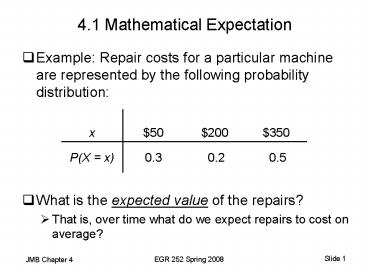4.1 Mathematical Expectation - PowerPoint PPT Presentation
Title:
4.1 Mathematical Expectation
Description:
4.1 Mathematical Expectation Example: Repair costs for a particular machine are represented by the following probability distribution: What is the expected value of ... – PowerPoint PPT presentation
Number of Views:43
Avg rating:3.0/5.0
Title: 4.1 Mathematical Expectation
1
4.1 Mathematical Expectation
- Example Repair costs for a particular machine
are represented by the following probability
distribution - What is the expected value of the repairs?
- That is, over time what do we expect repairs to
cost on average?
x 50 200 350
P(X x) 0.3 0.2 0.5
2
Expected Value Repair Costs
- µ E(X)
- µ mean of the probability distribution
- For discrete variables,
- µ E(X) ? x f(x)
- So, for our example,
- E(X) 50(0.3) 200(0.2) 350(0.5) 230
3
Another Example Investment
- By investing in a particular stock, a person can
take a profit in a given year of 4000 with a
probability of 0.3 or take a loss of 1000 with a
probability of 0.7. What is the investors
expected gain on the stock?
X 4000 -1000 P(X) 0.3
0.7 E(X) 4000 (0.3) -1000(0.7)
500
4
Expected Value - Continuous Variables
- For continuous variables,
- µ E(X) E(X) ? x f(x) dx
- Vacuum cleaner example problem 7 pg. 88
- x, 0 lt x lt 1
- f(x) 2-x, 1 x lt 2
- 0, elsewhere
- (in hundreds of hours.)
1 100 100.0 hours of operation annually, on
average
5
Functions of Random Variables
- Ex 4.4. pg. 111 Probability of X, the number of
cars passing through a car wash in one hour on a
sunny Friday afternoon, is given by - Let g(X) 2X -1 represent the amount of money
paid to the attendant by the manager. What can
the attendant expect to earn during this hour on
any given sunny Friday afternoon? - Eg(X) S g(x) f(x) S (2X-1) f(x)
- (24-1)(1/12) (25-1)(1/12) (29-1)(1/6)
12.67
x 4 5 6 7 8 9
P(X x) 1/12 1/12 1/4 1/4 1/6 1/6
6
4.2 Variance of a Random Variable
- Recall our example Repair costs for a particular
machine are represented by the following
probability distribution - What is the variance of the repair cost?
- That is, how might we define the spread of costs?
x 50 200 350
P(X x) 0.3 0.2 0.5
7
Variance Discrete Variables
- For discrete variables,
- s2 E (X - µ)2 ? (x - µ)2 f(x) E
(X2) - µ2 - Recall, for our example, µ E(X) 230
- Preferred method of calculation
- s2 E(X2) µ2 502 (0.3) 2002
(0.2) 3502 (0.5) 2302 17,100 - Alternate method of calculation
- s2 E(X- µ)2 f(x)
- (50-230)2 (0.3) (200-230)2 (0.2)
(350-230)2 (0.5) 17,100
8
Variance - Investment Example
- By investing in a particular stock, a person can
take a profit in a given year of 4000 with a
probability of 0.3 or take a loss of 1000 with a
probability of 0.7. What are the variance and
standard deviation of the investors gain on the
stock? - E(X) 4000 (0.3) -1000 (0.7) 500
- s2 ?(x2 f(x)) µ2
- (4000)2(0.3) (-1000)2(0.7) 5002
5,250,000 - s 2291.29
9
Variance of Continuous Variables
- For continuous variables,
- s2 E (X - µ)2 ? x2 f(x) dx µ2
- Recall our vacuum cleaner example problem 7 (pg.
88) - x, 0 lt x lt 1
- f(x) 2-x, 1 x lt 2
- 0, elsewhere
- (in hundreds of
hours of operation.) - What is the variance of X? The variable is
continuous, therefore we will need to evaluate
the integral.
10
Variance Calculations for Continuous Variables
-
(Preferred calculation) - What is the standard deviation?
- s 0.4082 hours
11
Covariance
- A measure of the nature of the association
between two variables - Describes a potential linear relationship
- Positive relationship
- Large values of X result in large values of Y
- Negative relationship
- Large values of X result in small values of Y
- Calculations based on the joint probability
distributions
- Y
12
What if the distribution is unknown?
- Chebyshevs theorem
- The probability that any random variable X will
assume a value within k standard deviations of
the mean is at least 1 1/k2. That is, - P(µ ks lt X lt µ ks) 1 1/k2































